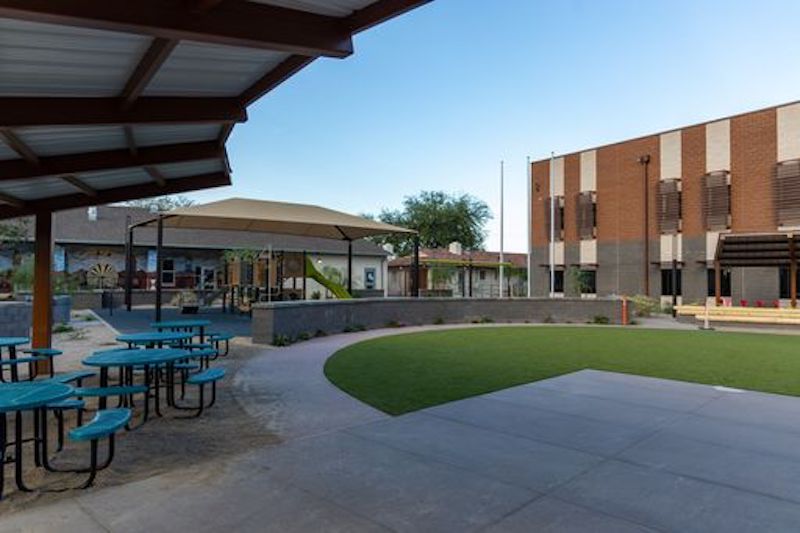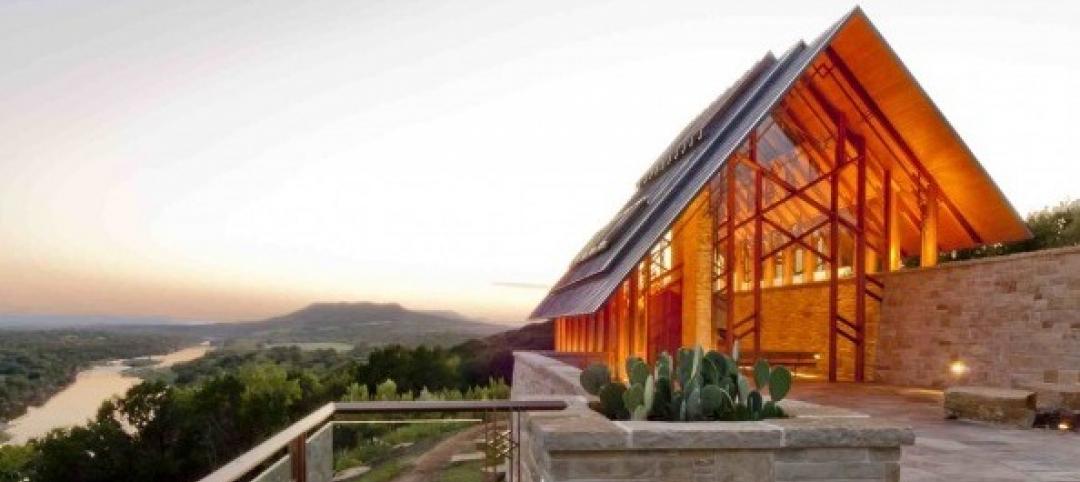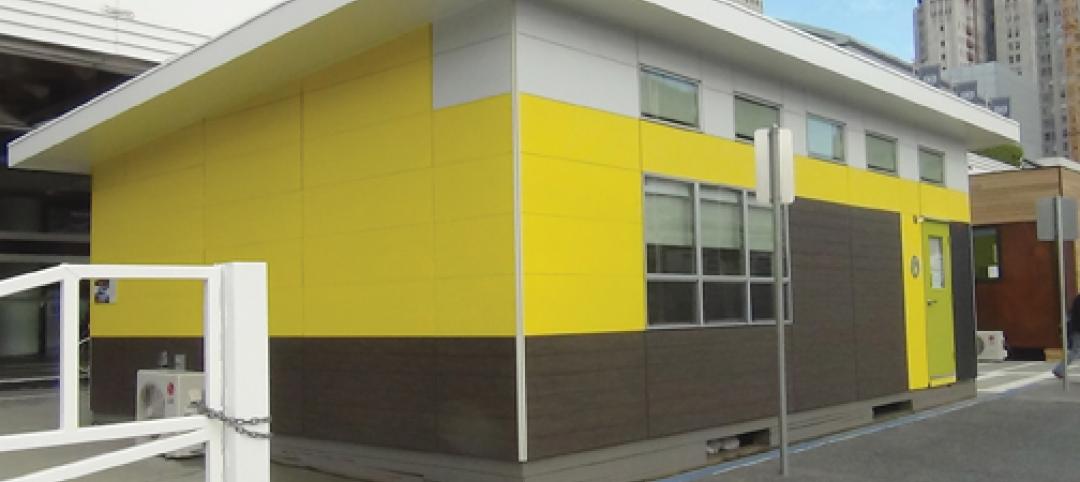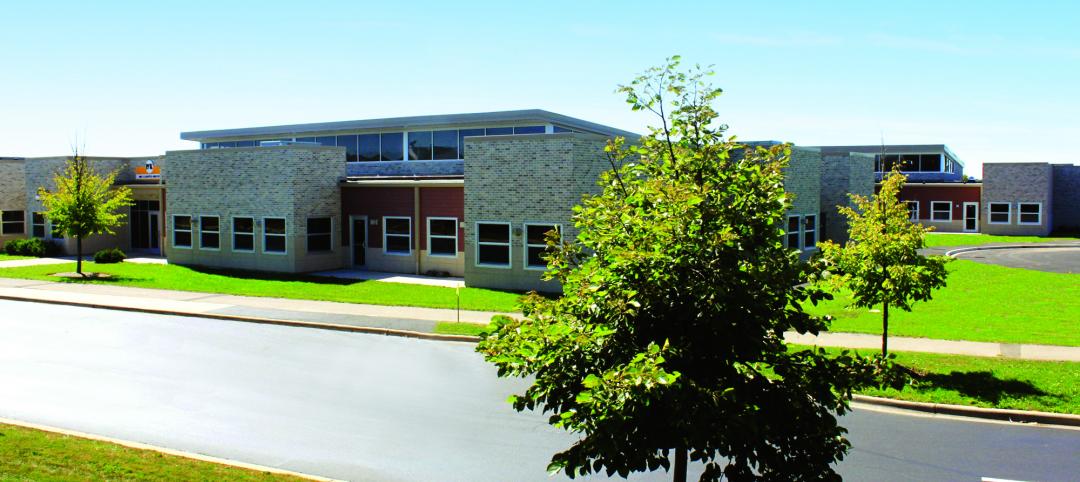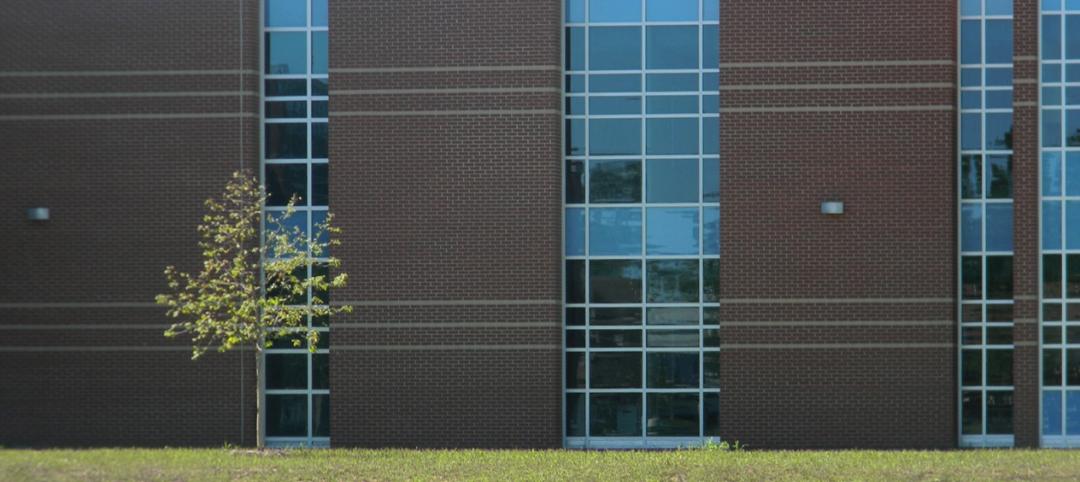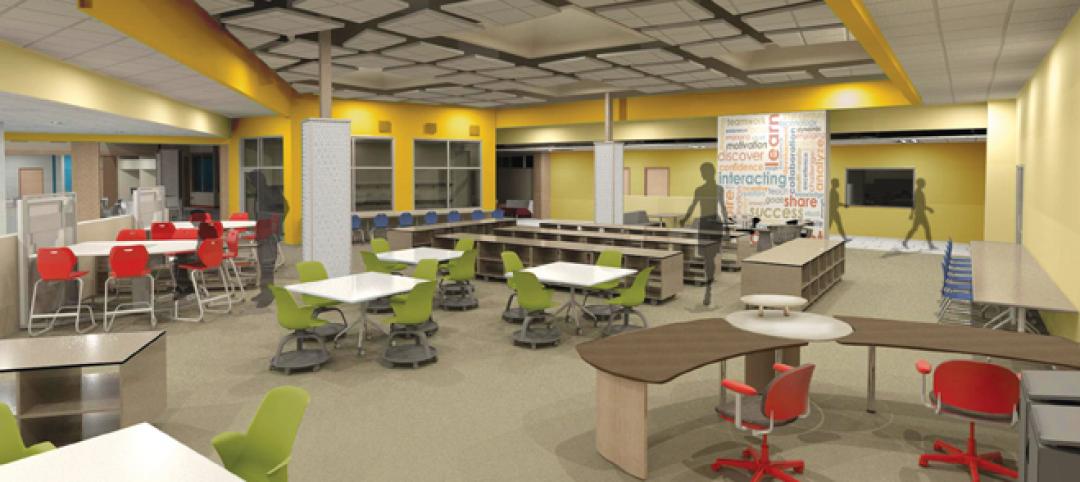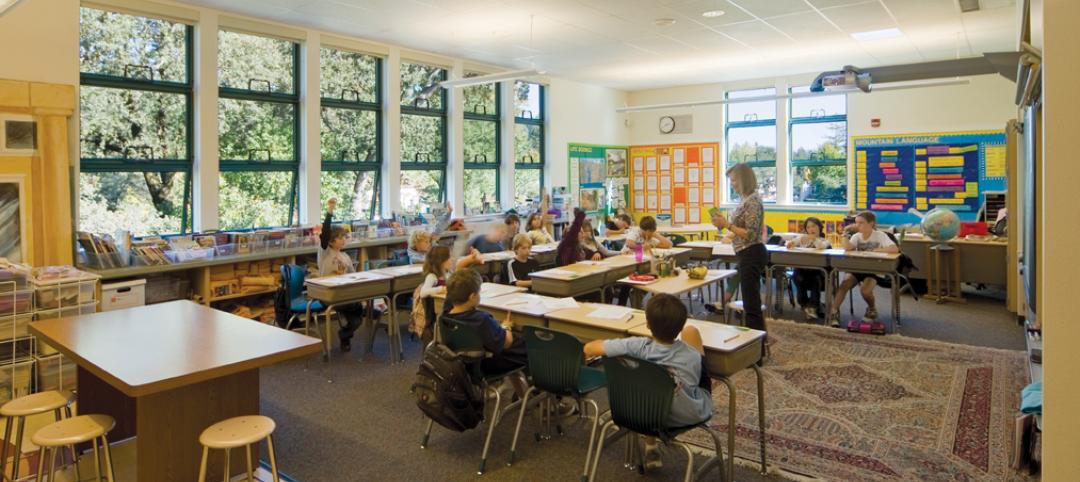Construction on the new Blackwater Community School, a two-story structure on the Gila River Indian Community, located southeast of Phoenix, Ariz., was completed on August 31. The school serves pre-school, the Family And Child Education Program (F.A.C.E.), and a K-5 grade school.
The two-year-long build on the 7.43-acre campus was in conjunction with Rosendin, the nation’s largest employee-owned electrical contracting company, along with Gilbane Building Company and design partner Breckenridge Group.
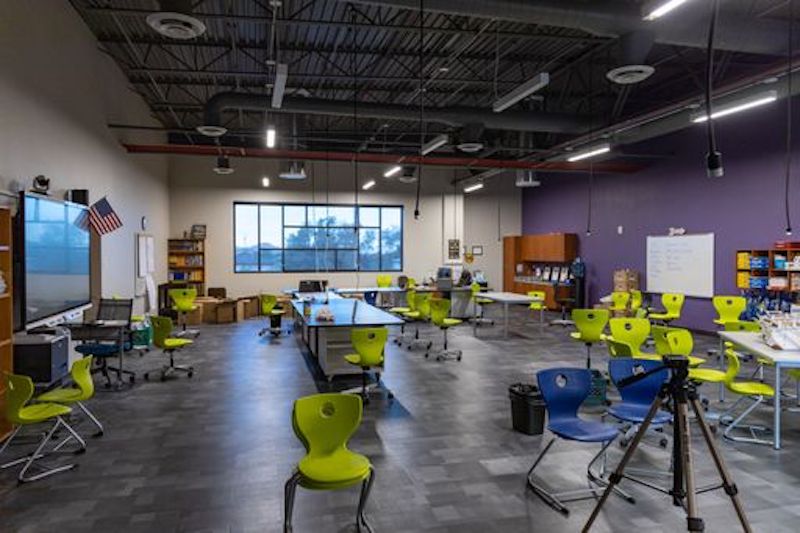
The $25 million replacement campus incorporates culturally significant artwork throughout the two-story classroom building, media center, multipurpose building, and cafeteria. The Blackwater Community School Culture Committee provided the insight for the cultural art in partnership and with the approval of the Blackwater Community School Board. Rosendin’s team worked on lighting, playground areas, basketball courts, sports fields, and reading patios.
The Blackwater Community School serves two distinct tribes: the Akimel O’Otham, who can trace their ancestry to the Hohokam; and the Pee Posh, who come from Yuma ancestry.
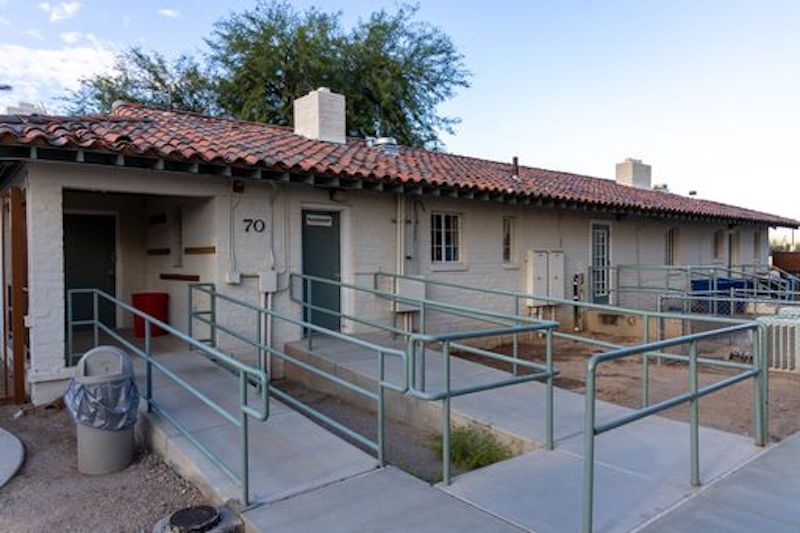
“The Blackwater Community School is the heart of the community and celebrates the Gila River Indian Community’s heritage throughout the year,” said Jagdish (Jack) Sharma, Principal of Blackwater Community School. “Agriculture is at the heart of the Akimel O’Otham culture. Our educators take pride in our quality educational practices and the presences of tradition’s. This is the reason why traditional symbols of the culture are placed throughout the new campus.”
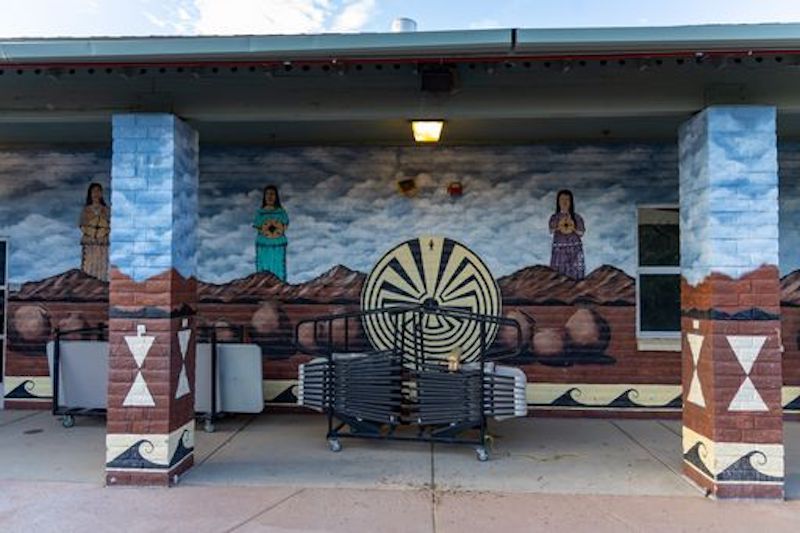
The Hohokam made contributions to the earliest forms of technology in the Southwest with the introduction of agriculture, irrigation canals, and extensive trade networks. Exterior and Internal murals throughout the campus depict those contributions with scenes of crop harvesting, desert landscapes, and petroglyphic symbols like the Man in the Maze, or Se:he. A shade structure has been built with metal shaped to look like cactus ribs, a material the Akimel O’Otham would use to build communal gathering space ramadas.
“There is a blue and pink mural in one of the hallways depicting the desert at night," said Sharma, speaking to the Blackwater Community School Culture Committee’s interpretation of the artwork. "Blackwater’s name comes from the standing water getting dark with night. In the glow of the moon, fish would appear. In the moon, there are two flute players, a reference to 'Man of the Maze.' There are murals like this all over campus that reflect our student’s culture enriching their overall learning experience,”
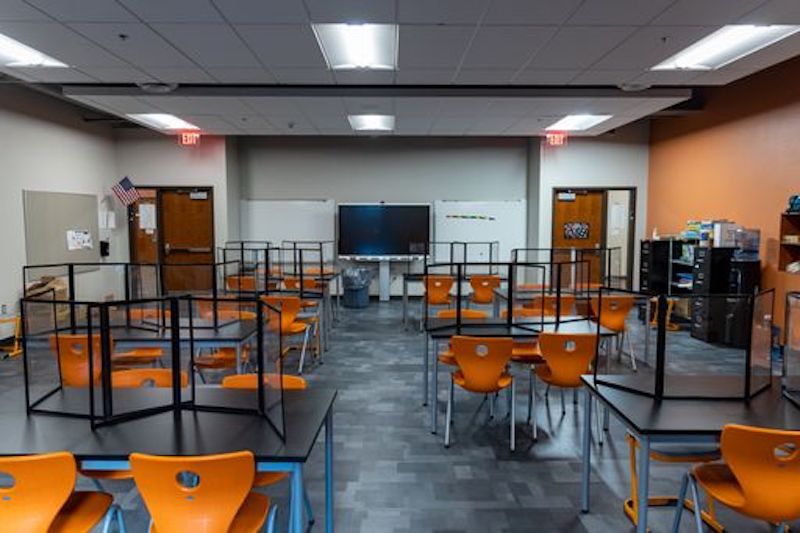
The school was originally built in 1939 and in 2018, received through other different funding sources, and Gila River Community Council, Bureau of Indian Affairs (BIA), monies for a replacement school.
“Rosendin is proud to have built the new elementary school in the Gila River Indian Community to give students the very best environment to learn and grow,” said Ben Miller, Rosendin Division Manager. “The school will serve as the hub of the larger community and support family education and culture in the local area."
The two-year campus build required an aggressive phasing schedule to implement construction while school was in session. Parts of the project were scheduled over winter and summer breaks to mitigate disruption to students.
“Blackwater Community School will serve as a pivotal gathering and educational spot for children and adults on the Gila River Indian Community," said Jeff Keck, Senior Project Executive, Gilbane Building Company. Gilbane is proud to work with Rosendin and other trade partners to have safely built a new campus to support this community’s families, cultures and traditions,”
ABOUT ROSENDIN
Rosendin, headquartered in San Jose, Calif., is the largest employee-owned electrical contractor in the United States, employing over 7,000, with revenues of $2 billion. Established in 1919, Rosendin remains has built quality electrical and communications installations for morethan a century. More information at: www.rosendin.com
ABOUT GILBANE BUILDING COMPANY
Gilbane provides a full slate of construction and facilities-related services – from pre-construction planning and integrated consulting capabilities to comprehensive construction management, general contracting, design-build, and facility management services. Founded in 1870 and still a privately held, family-owned company, Gilbane has more than 45 office locations worldwide. More information at: www.gilbaneco.com.
Related Stories
| Feb 5, 2013
8 eye-popping wood building projects
From 100-foot roof spans to novel reclaimed wood installations, the winners of the 2013 National Wood Design Awards push the envelope in wood design.
| Dec 9, 2012
Greenzone pop quiz
Greenbuild attendees share their thoughts with BD+C on the SAGE modular classroom.
| Dec 9, 2012
Modular classroom building makes the grade
SAGE modular classroom opens eyes, minds at Greenbuild 2012.
| Dec 9, 2012
AEC professionals cautiously optimistic about commercial construction in ’13
Most economists say the U.S. is slowly emerging from the Great Recession, a view that was confirmed to some extent by an exclusive survey of 498 BD+C subscribers whose views we sought on the commercial construction industry’s outlook on business prospects for 2013.
| Nov 19, 2012
Modular and Site-Built Construction Combine to Accelerate School Delivery
In Pingree Grove, Ill., DRH Cambridge Homes selects modular construction for the creation of the Cambridge Lakes Learning Center, home of a new charter school for the village community's growing student population.
| Nov 11, 2012
Greenbuild 2012 Report: K-12
High-performance schools put ‘sustainability’ in the lesson plan
| Oct 22, 2012
Two-Hour Curtain Wall Lets Light In and Keeps Fire Out at Prairie Hills Junior High School
New school’s south-facing elevation features a glazed aluminum curtain wall that incorporates PPG Solarblue and PPG Solarban 60 glazing.
| Sep 7, 2012
Net-zero energy pioneers on the el-hi frontier
Getting to net-zero is not easy, but the promise of eliminating energy bills and using state-of-the-art technology as a learning lab can make a compelling case to reach for net-zero.
| Sep 7, 2012
The keys to success in the K-12 school market
When educators and school administrators describe their vision for new K-12 school buildings as ‘21st-century learning spaces,’ they’re not exaggerating. Many new schools are truly different in concept from their counterparts of only a few years ago.
| Jul 20, 2012
2012 Giants 300 Special Report
Ranking the leading firms in Architecture, Engineering, and Construction.


